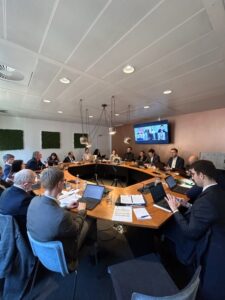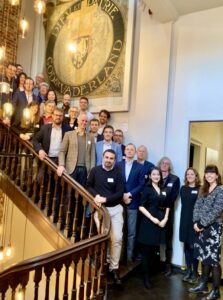ReConnect China delivering inputs to the EU-KNOC 2.0 Core Group and the 1st China Cluster Meeting in Brussels
On February 27, ReConnect China was invited to participate in two China-related meetings organised by the European Commission in Brussels. In the morning, Bart Dessein, coordinator of ReConnect China, and Philipp Brugner, task leader on EU-China STI cooperation, presented updates from the project during the EU-KNOC 2.0 CCG Meeting (EU-Knowledge Network on China Core Group Meeting). The EU-KNOC 2.0 initiative brings together several European partners aiming to support the EC and EU Member States in their strategic approach to R&I cooperation with China. Its work builds on the results delivered by EU-KNOC 1.0, which was implemented between July 2020 and October 2021.
The meeting was organised by the Directorate General for Research, Technology and Development (DG RTD) and gave ample space to both current Horizon Europe projects dealing with China (DWARC and ReConnect China) to present about their activities, including research, policy advice and public engagement work.
At the end, an open floor discussion between the experts from both projects, the EU-KNOC 2.0 Core China Group Delegates, the Science Counsellors of the EU MS (which were connected online from Bejing) and representatives from the EC and the EEAS brought several interesting questions in regard to upgrading independent knowledge on China in Europe to the table. Science Counsellors of EU MS were mainly interested to learn how DWARC and ReConnect China may be able to complement the work done by EU-KNOC 2.0.
The 1st China Cluster Meeting: Exploring synergies between EU-funded research on China
In the afternoon, the consortium members of DWARC and ReConnect China moved over to the premises of Bruegel, a partner in DWARC. There, again at the request of DG RTD, the so called “China Cluster Meeting” took place. The format’s birth can be understood against the EC’s will for more research harmonisation and joint agenda setting across Europe’s fragmented research (and policy advice) landscape on China. With ReConnect China and DWARC the EC now has two recently started project at hand, which may help to steer this process in the near and more distant future (ReConnect China runs until 2026 and DWARC until 2025).
In this vein, the 1st China cluster meeting provided an informal setting to explore and already concretise answers to the following questions:
- In which fields of research and the drafting of policy recommendations can ReConnect China and DWARC cooperate most effectively in the next three years?
- How to support the two projects in developing a shared public recognition as the EU’s research cluster on China?
- How to draw those China experts (individuals and institutions) closer to the work of the China cluster who are not members of the two projects?
At the meeting, ReConnect China was represented by Bart Dessein and Huanyu Zhao from University of Ghent (coordinators), Astrid Pepermans and Victor De Decker from Egmont Institute (WP4 leader), Xiaoxue Martin from Clingendael (WP5 leader) and Philipp Brugner from ZSI (WP6 leader). In addition, our colleagues Christian Göbel (University of Vienna, WP3 leader) and Roger Greatrex with Diego Mathias (CCCM, WP2 leader) joined online.
